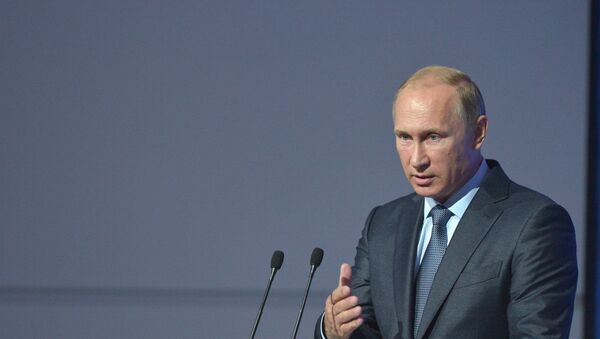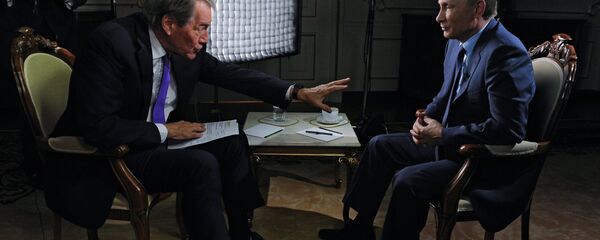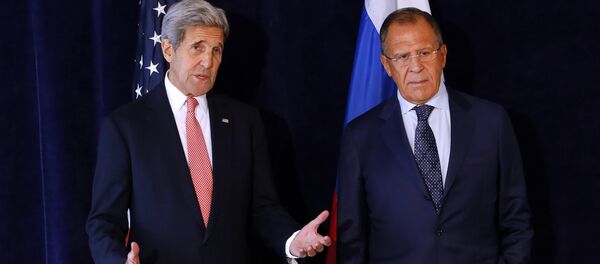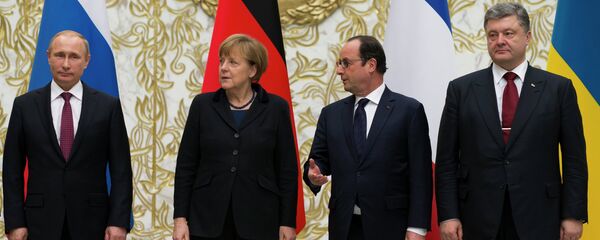Russian President Vladimir Putin is expected to speak about the situation in Syria and the international cooperation in the fight against terrorism, among other issues.
Analysts do not rule out that Putin will touch upon the Ukrainian issue, but forecast that it is unlikely to be the major issue on the agenda.
"The President will arrive in New York in the morning [September 28] and immediately go to the UN headquarters, where his speech is scheduled for approximately 10:45 [14:45 GMT]. After that, we are planning to hold a meeting with UN Secretary-General Ban Ki-moon. By this, we want to emphasize the importance we attach to the central role of the UN and its Security Council in international relations," Putun's aide Yuri Ushakov told journalists ahead of the Russian leader's visit to New York.
Putin will also attend a luncheon hosted by the UN Secretary-General in honor of heads of the delegations attending the session.
The Russian leader is also expected to hold a number of separate bilateral meetings.
According to Kremlin spokesman Dmitry Peskov, Putin works on the text of his speech at the UN General Assembly on his own.
"Preparation for the speech are going on for about a month. The president traditionally sketches main ideas, then his speechwriters and experts put on paper a raw version, and then, for a few weeks, the president works on the text on his own, which he edits later," Peskov told reporters.
Peskov added that Putin's visit will last for one day and does not involve an overnight stay.
In his speech, Putin is very likely to address the Syrian issue, as well as measures to counter the Islamic State (ISIL) militant group, which operates in the war-torn country.
The ISIL militant group, notorious for its excessive brutality and multiple human rights violations, is currently in control of vast territories in Iraq and Syria.
On Friday, the Russian head of state held a meeting with the permanent members of the Russian Security Council, during which a detailed exchange of views in the context of the upcoming Putin's speech at the UN General Assembly took place.
"It is obvious that most speeches at the UN General Assembly will be focused on the Syrian issue and the ISIL threat, and one can assume that President Putin will also concentrate on the issue. With a high degree of probability," Peskov said.
Apart from Syria, Putin's speech is likely to include various challenges and topics related to the Middle East in general, the Kremlin spokesman said.
Experts believe that the president will reiterate Russia's position on the need for a fortified anti-terrorist front.
"For sure, [Putin] will call [on the international community] to unite in a joint fight against the common enemy, Islamic State, which is a major threat," head of the International Security Center at the Russian Academy of Sciences Alexei Arbatov told RIA Novosti.
Director of the Institute of Strategic Studies Sergey Oznobischev believes that the call to unite will finally be heard.
"We are already there [in Syria]… so everyone needs to take us into account, to cooperate with us. Further deterioration [of the situation in Syria] is not beneficial for the US elite…. The West is also tired of a constant "showdown" on how to settle relations with Russia," Oznobischev said in an interview with RIA Novosti.
In late June, Putin offered the Syrian government, as well as other countries in the region, including Turkey, Jordan and Saudi Arabia, to unite in the fight against ISIL.
The situation in Ukraine was high on the agenda of the 69th UN General Assembly.
In 2015, as some experts forecast, the topic is likely to be downplayed, at least in Putin's speech.
"One cannot help avoiding speaking about Ukraine, but it will not be the main issue. Most likely, the situation in Ukraine will be neither a leitmotif nor the essential element. One cannot walk away from this topic, but… it gets tiresome," Chairman of Presidium of the Russian Council on Foreign and Defense Policy Fyodor Lukyanov said.
Following the reunification of Crimea with Russia in March 2014 and an escalation of the Ukrainian crisis later that year, Russia's relations with the West, including the United States, deteriorated.
The West blames Russia for interfering with Ukraine's internal affairs and, as a punitive measure, has imposed several rounds of sanctions against Moscow. Russia has repeatedly denied the allegations.
"On the Ukrainian crisis, we will hear the same that we had heard before. [Including], perhaps, mild accusations against the West,… I do not know whether a point of view that a strong anti-Russia sentiment is gaining momentum in the West will be mentioned at all," Arbatov said.
In general, experts agree that the Russian president's speech at the UN General Assembly, his calls for cooperation, could mark a gradual improvement in the relations between Russia and the West.




